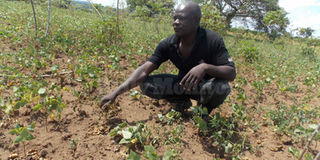Farmer counts losses, blames seeds, drought

Kimera displays some of the dying bean plants in his garden. PHOTO/MICHEAL J SSALI
What you need to know:
- He took a loan from a microfinance institution to grow beans but he is now struggling to service it after failing to harvest beans due to a severe drought that has hit the area since March when he planted the beans.
Farming is not always a bed of roses. Sometimes farmers make big losses. Like all other human beings farmers cannot really predict what the future holds for them.
They have no control over nature and they are not sure whether there will be a disastrous hail storm before they harvest their crop.
They do not know if there will be a dangerous and unusual pest attack and they are not sure if the rains will fail.
Misfortunes
There is always that period between when a decision is made to plant a crop and when the crop is harvested. So many things may happen during that period including yield and price fluctuations.
Due to such factors as undetected poor soil fertility or floods the yield may be too low for the farmer to recover even the money that was invested.
Sometimes the yield may be quite high and satisfactory but the farmer may realise that all the other farmers have had very good yields and the prices for the crop have dropped.
Just a few weeks ago many farmers supplied beans and maize to schools on credit hoping to be paid later when the students have paid their school fees.
However no sooner had the schools opened than they were suddenly closed due to Covid-19 lockdown. The farmers will therefore have to wait for their payment perhaps till the schools reopen.
Such losses and misfortunes are quite common in farming as in all other enterprises.
Kimera counts losses
One farmer who has undergone an experience of that kind is Mr Stephen Kimera Lwabukadde of Kitabyama Village, Lwengo Sub-county, and Lwengo District.
He took a loan from a microfinance institution to grow beans but he is now struggling to service it after failing to harvest beans due to a severe drought that has hit the area since March when he planted the beans.
Kimera has been growing beans for the last 20 years on seven acres of land which, as he confesses, belongs to a one Mr Joseph Kizito of Rubaga in Kampala.
“He has kindly allowed me to grow some crops on his land and I have been growing beans, maize, and cassava on the land for years and making good profits, which has enabled me to buy my own land,” he told Seeds of Gold.
“But this time things have gone the other way round.” He said he expected to harvest at least 8,000 kilogrammes of beans as he has often done in the past. This time, however, he did not even expect to harvest the 528 kilogrammes that he planted.
Poor seeds
The beans in the seven-acre-field were stunted and yellowing. Some had actually dried up. Asked what variety of beans he planted, he simply replied: “Naads”. National Agricultural and Advisory Services (Naads) has often assisted farmers with advice and seed provision and some farmers now have come to refer to the different bean variety seeds supplied by the organisation simply as Naads.
Asked where he bought the seeds, he replied, “A farmers’ shop in Mbiriizi Town where I have always bought the seeds from.”
He said he had borrowed Shs2m from Lwengo Microfinance Cooperative Society in March to carry out some of the activities such as paying the labourers, buying the seed, paying for water for spraying fertilisers, herbicides, and pesticides.
He said he paid Shs1.6m for 528 kilogrammes of bean seed, and paid Shs1.15m to the labourers that did the planting and spraying the crop with urea and some pesticides and herbicides.
He paid Shs100,000 to the boda boda rider who transported jerricans of water to the field. He also spent some money on the herbicides, pesticides, and urea.
“Soon after planting we received some rain and as usual we sprayed the beans with some urea solution when most bean plants had three leaves. We sprayed again with urea after three weeks. This normally gives great vigour to the beans. We also sprayed the beans with vegimax, a pesticide that prevents blight disease,” says Kimera.
To reduce production costs, Kimera sprayed a selective herbicide, potent, which kills the weeds but does not kill the beans.
“However all our efforts were in vain because the rains stopped and, due to rain scarcity, the beans were wilting and drying. Yet I am expected to pay back the loan and the interest due of Shs760,000. This is not to suggest that I regret going for the loan since I have always borrowed from the same institution and actually benefitted,” Kimera says.
Under normal circumstances Kimera said he sometimes harvests between 7,000 and 8,000 kilogrammes of beans which he sells to schools or some traders from Kampala.
“To the schools I normally sell at Shs2,300 per kilogramme but to the traders I can even sell at just Shs2,000 a kilogramme. The reason I charge schools a little extra money is that they usually take long to pay and they are very strict about cleanliness. As a farmer I spend more time removing foreign objects. They take the beans and take weeks to pay. As for the traders, they come, look at the beans, discuss the price, pay cash, and take the beans,” he says.
Kimera is now burdened with servicing the loan by paying instalments of at least Shs80,000 per month for the first six months and to ensure that the rest of the money is paid in the period agreed between him and the financial institution.
Advice
Mr Charles Katamba, programme manager of Community Enterprises Development Organisation (Cedo) which works to promote food security and bean production among other things in Masaka says: “Farmers such as Kimera should ensure that they get their seed from certified seed shops and not from just any farmers’ shops.” Katamba strongly believes Kimera could have purchased expired seeds or some fake beans and planted them.
“Farmers should understand that these days National Agricultural Research Organisation (Naro) has come up with different bean varieties bred to give high yields and to be drought or stress tolerant. These are the beans that prudent farmers should grow,” says Katamba.




